CCG Roundtable Commenmorating China’s Accession to the WTO
May 14 , 2021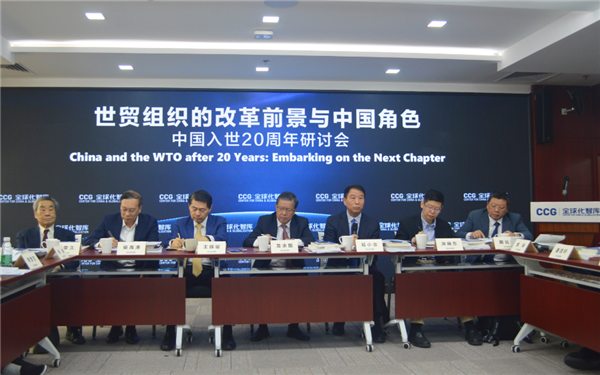
2021 marks the 20th anniversary of China’s accession to the WTO. On May 14, the Centre for China and Globalization (CCG) hosted a roundtable on the theme of “China and the WTO after 20 years: Embarking on the next chapter.” During the event, distinguished speakers reviewed the 20 years since China joined the WTO, discussed prospects for WTO reform and the potential role of China, and the future of the WTO and regional integration, hoping to advocate a multilateral trading system and the development of economic globalization.
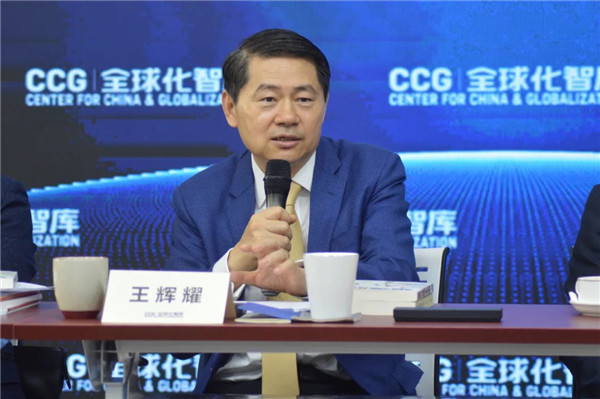
Wang Huiyao, CCG president gave welcoming remarks. Keynotes were given by Long Yongtu, CCG chairman and former minister of Foreign Trade and Economic Cooperation as well as chief negotiator for China’s resumption of the General Agreement on Tariffs and Trade (GATT) and its accession to the WTO, and Yi Xiaozhun, former deputy director-general of the WTO, and former deputy minister of Commerce. The roundtable was hosted by Miao Lu, CCG secretary-general.
Wang Huiyao, CCG president, says 2021 marks not only the 20th anniversary of China’s accession to the WTO, but also the 50th anniversary of ‘ping-pong diplomacy’ and the restoration of China’s lawful seat in the UN. For decades, China has been continuously deepening its participation in the process of globalization, maintaining multilateralism and actively advocating better global governance, and these have made a positive impact on world development.
China’s accession to the WTO was a milestone for China’s opening-up policy as well as the process of globalization. 20 years after the accession to the WTO, China has become the world’s second-largest economy and contributed significantly to the growth of global trade as well as sustainable economic development. In the future, China will play an increasingly positive role in the reform and development of the WTO. Wang said on the occasion of the 20th anniversary of China’s accession of the WTO, this roundtable was exceptionally meaningful and CCG hopes to play a more active role as a think tank in fostering China’s progress of globalization.
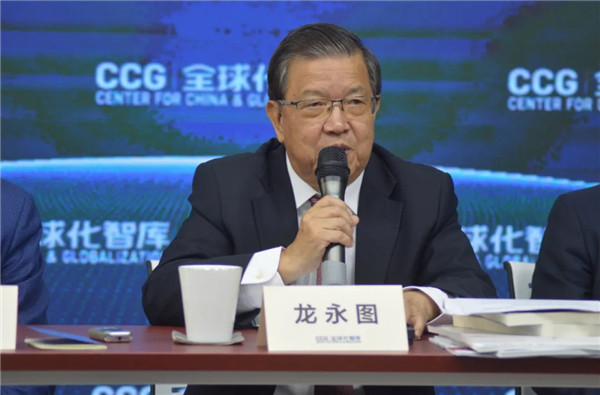
Long Yongtu advised that the commemoration of the 20th anniversary of China’s accession to the WTO should be included as part of the studies for CPC’s a hundred year anniversary, for its great significance to contemporary times. Further, Long suggested that the admission of China to the WTO enabled two major breakthroughs for the reform and opening-up policy of China. It initiated China’s transformation from a planned economy to a market economy and advanced China’s opening of its domestic market to the world. Long argued that China’s successful admission to the WTO generated an equally beneficial result for both developed countries and developing countries, especially the latter. It was also hugely beneficial for developed countries including the US, which was one of its biggest beneficiaries. As a representative of developing countries, China hopes to offer more perspectives for green and fair development under the “new norms”.
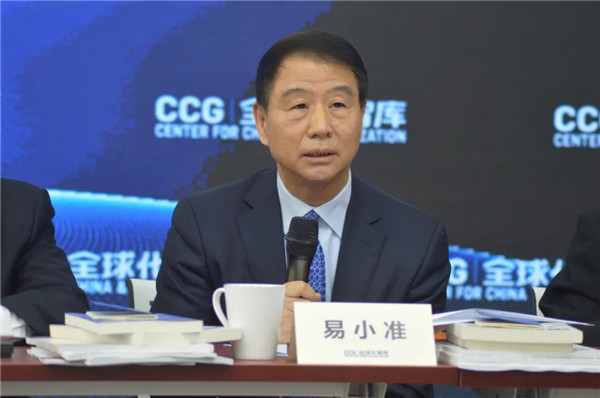
Yi Xiaozhun reviewed the 20 years since China’s accession. He cited statistical evidence that China has made equally astonishing progress on its exports and imports in the 20 years since accession, yet China’s huge increase in imports is something that is often neglected when discussing China’s achievements in these two decades. He noted the total import of services rose from 3.3% of the global total in 2005 to 8% in 2020. Nevertheless, Yi said as the world’s second-largest economy and largest exporter, China should not be complacent. Regarding the challenges the WTO currently faces, Yi believes that China could respond by further reform and opening-up. Furthermore, China is capable of playing a more progressive and ingenious role in reform of the WTO. For instance, innovative methods of discussion and negotiation initiated by China, such as the initiation of multilateral discussions on the issue of investment facilitation in the WTO, are now widely accepted and even imitated domestically by other member states. How China uses its status and influence in the WTO to advance the current multilateral system towards further trade liberalization and facilitation, instead of slipping towards trade-protectionism, is a new question.
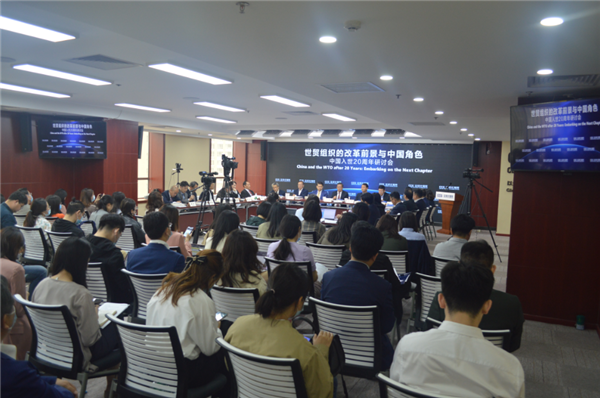
Other participants in the roundtable included Xue Rongjiu, professor at University of International Business and Economics, and president of China Society for World Trade Organization Studies; Hong Xiaodong, former director of the WTO division of the Ministry of Commerce; Chai Haitao, director of China International Economic Exchange Center and former director of Policy Research Office, Ministry of Commerce; Dai Changzheng, dean and professor at School of International Relations, University of International Business and Economics; Wang Yong, professor and director of Center for International Politics and Economy Studies, Peking University; Lu Jinyong, professor at the School of Trade and Economics, University of International Business and Economics; Mike Liu, vice president of CCG; Xu Xiujun, deputy director of International Political Economy Division at Institute of World Economics and Politics (IWEP), Chinese Academy of Social Sciences (CASS).
Admission of China to the WTO has created a win-win relationship for both China and the world
Following the keynote speech made by Yi Xiaozhun, a number of speakers including Xue Rongjiu and Hong Xiaodong acknowledged in their speeches that China has benefited enormously from accession to the WTO and the multilateral trading system it created, which has been crucial to the development of both the Chinese and global economy. This is evident from China’s two decades of rapid economic growth.
Xue Rongjiu argued that the accession to the WTO was a key milestone for China’s reform and opening-up policy and Yang Yi said that China succeeded in the WTO mainly due to three reasons. First, the accession was valued greatly by the party leaders and the country had reached a national consensus on the issue. Second, a specialized team also played a vital role in safeguarding various detailed works to be carried out smoothly. Third, China not only focused solely on opening up, but also safeguarded the interests of its domestic industries. Yang said it is precisely the relentless efforts from both the government and the Chinese people that enabled China to be a positive member of the WTO.
According to Xu Xiujun, the world has benefited considerably and will continue to benefit from trading with China’s massive domestic market. This was agreed by the Deputy Executive of Dell Greater China, who stated that transnational companies such as Dell were also great beneficiaries of China’s accession to the WTO. Li Yong also argued that China has never taken advantage of the rules of the WTO, instead, it used its huge domestic market to benefit the rest of the world.
WTO in Crisis
Hong Xiaodong pointed out that the world is currently undertaking a major readjustment. Economic globalization and multilateralism are both threatened by the rise of unilateralism and protectionism.
Li Yong argued that politicization has twisted the economic logic behind trade liberalization and economic globalization, and that unilateralism has been exploiting the concept of security threats to challenge the effectiveness and authority of the WTO.
Dai Changzheng suggested the WTO faces issues with both its effectiveness and efficiency. More importantly, as developing countries grow, disputes of interest become increasingly complicated in a system that is dominated by Western powers.
Li Luosha criticized WTO reform for failing to implement agreements of the Doha Round and other specific policies. Although the WTO has encouraged the flow of goods and services on a global scale, and improved the prosperity of the global economy, it has also led to an increasingly widening gap of global disparity.
Asked about the factors contributing to the WTO’s current crisis, Lu Jinyong cited the following: firstly, its decision-making process desperately needs to be reformed, as it is highly difficult to reach a consensus under the current decision-making mechanism. Secondly, its authority has been significantly challenged by bilateral and regional free trade agreements.
Li Luosha advised that “development” should be written into the fundamental goals of the WTO, which means the core of the WTO should shift from global trade management to global human development governance. Human development rather than market access should be used as the highest standard of measurement.
WTO reforms still face considerable difficulties, and Li Yong argued that there are three questions which we need to be asking. Firstly, could the WTO break its own rules to make new rules? Secondly, could the new rules be fully non-discriminatory? Thirdly, are the new reforms only aimed to fulfill the demand of a few countries or all of its members?
US-China relations are at the heart of the WTO crisis
Other speakers including Xue Rongjiu and Wang Yong implied that the future of the WTO is closely connected with US-China relations. As Rong Changjiu stated, since the US and China are two of the major members of the WTO, how the two countries resolve their disputes within the WTO would shape prospects of the institution. He argued that in the two decades since accession, China has followed the rules of the WTO and kept its promises, whereas the US violated the development model of the WTO and went against the trend of globalization. As such, Xue advocated more cooperation between the two governments in tackling the difficulties of WTO reform together.
Professor Wang Yong suggested that deteriorating US-China relations has caused the retreat of globalization. The world could continue to globalize only if governments rebuild their mutual trust. Wang Yong also suggested that US-China disputes are not only caused by strategic competition, but also great ideological differences. Therefore, we should seek to find more common ground between Chinese socialist core values and the so-called “universal values” of the Western world. Wang Yong also said although the Biden administration largely adopted the policies of the Trump administration, they are still essentially different. The Biden administration values common interests between the US and China more. To follow, a constructive discussion which seeks to find a solution that suits the interests of both parties should be the priority for US-China relations. Lastly, cooperation is still possible between the US and China, and a new cold war is avoidable if common interests are recognized. Wang said there is still large room for understanding and cooperation in areas such as global governance and especially, in the reform of global economic governance.
China’s future role in WTO reform
First and foremost, it was agreed by the majority of speakers that in light of the current international environment and the crisis of the WTO, China should respond with further reforms and opening-up, and firmly support the multilateral system and economic globalization.
Chai Haitao promoted China’s role in globalization because it coincides with its global strategy and objective to build a community with a shared future for mankind. Chai said China should continue to open up to higher standards, in the sense that China should shift from solely opening up based on flows of goods and factors of production to institutional opening-up. It has been evident that the WTO is a system that can be beneficial to China, thus it is crucially important for China to build a more systematic, full-scaled, and institutional structure for opening-up.
In terms of China’s role in future WTO reform, Xu Xiujun suggested that China is a contributor as well as a maintainer of its rules and institutions, and its role as a maintainer is especially important. Xu said WTO reform needs to maintain a set of fair and reasonable multilateral rules, and should seek to eliminate differences in the treatment of its member states as well as to bridge the differences between China’s and the world’s rules of trade.
Dai Changzheng suggested that China should maintain the authority, effectiveness and rules of the WTO while improving institutional transparency. China should not only unite developing countries, but also balance interests between developing and developed countries, and play a more active role under the framework of the WTO.
This view was agreed with by Xue Yongjiu, who also stated that China should oppose trade protectionism that violates the rules of the WTO. Moreover, China, as a developing country, could give up certain developing country privileges to become a middle-man in the negotiations between developing and developed countries in the WTO. Hong Xiaodong concluded that facing current challenges, unilateralism and protectionism should be rejected while continuing to improve the efficiency of multilateralism.
Looking ahead to the MC12
Finally, Hong Xiaodong asserted that the 12th WTO Ministerial Conference (MC12) will be a test of the new Director-General of the WTO’s ability to lead the WTO out of its current struggle. For member states of the WTO and corporations around the world, this is an opportunity for the WTO to prove its capability of leading global trade liberalization and facilitation by making progress and establishing new rules at the MC12. As such, Hong Xiaodong expressed his aspirations for the conference, hoping that consensus could be achieved, progress could be made and confidence could be gradually restored in the WTO. However, Li Yong was less optimistic about the MC12, saying that while some progress may be made at this phase, consensus is still hard to achieve due to the current international environment.






